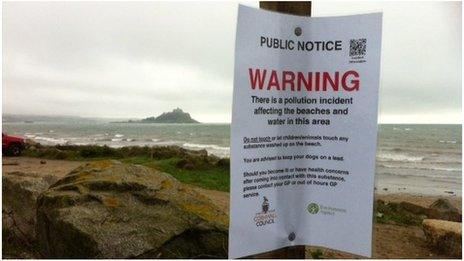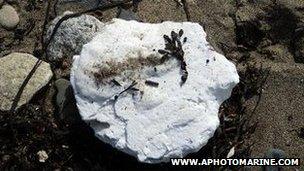Cornwall beach clear-up begins after palm oil identified
- Published

Long Rock near Penzance is among the beaches being cleared of the palm oil
The clear-up of a substance on Cornish beaches has begun after it was found to be palm oil, a contractor says.
A dog that ate the substance died and several others became sick, according to vets.
Cory Environmental, which works for Cornwall Council, said it was removing the substance after it was identified as "safe to touch".
Public Health England (PHE) said the substance was identified as a "non-harmful oil-based product".
'Clearly turned rancid'
PHE had warned people to avoid 11 west Cornwall beaches, although Cornwall Council did not close them.
Cornwall Council contractors Cory put up warning signs on the beaches affected by the substance, which was first seen on Sunday at Pedn Vounder beach and was described by witnesses as smelling like firelighters.

The substance was said to smell like firelighters
Beaches affected included Praa Sands, Porthcurno and Penzance promenade.
Cory said the clear-up was starting "straight away".
PHE said the substance had been confirmed as a "non-toxic, degraded, edible oil or fat".
Dr Femi Oshin - from PHE Devon, Cornwall and Somerset - said: "It's reassuring that the substance has been found to be some kind of cooking oil.
"It has clearly turned rancid and that's why we've had reports of it smelling so bad.
"While not harmful to people, it's unpleasant, and we'd still advise people - and dog owners with their pets - to keep away from it, and allow the council's contractors to get on with taking it away and disposing of it."
PHE also warned it was possible the substance would affect other beaches over the forthcoming days.
The substance was analysed by the Maritime and Coastguard Agency (MCA).
Palm oil has a wide variety of uses and is found in food, soaps and shampoos and biofuels.
The source has yet to be identified.
- Published24 July 2013
- Published9 September 2013
- Published23 October 2013
- Published22 October 2013
- Published24 August 2013
- Published14 April 2013